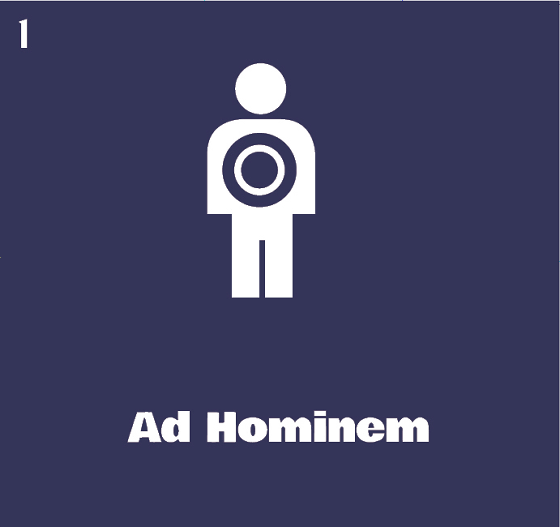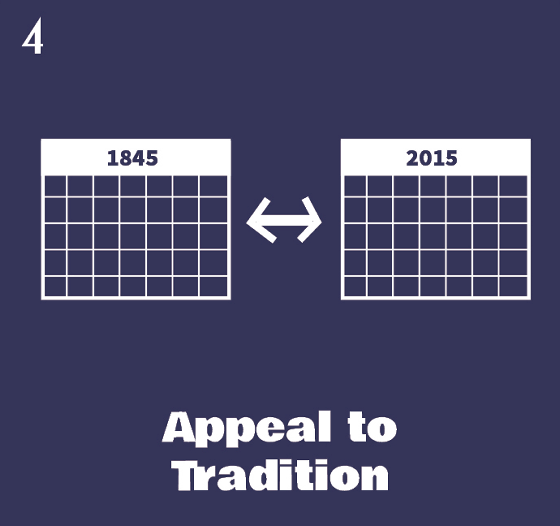Thinking method 30 patterns that are destined to "defeat" in discussion

ByAlvaro Tapia
Everyone has the experience of "There is no discussion at all", but it may be because the other party is not logical. Thirty patterns of thought are destined for "losing" in the discussion.
The Logical Fallacy Collection: 30 Ways to Lose an Argument
http://thevisualcommunicationguy.com/2014/12/29/the-logical-fallacy-collection-30-ways-to-lose-an-argument/
◆ 01: Ad Hominem (Human Attack)

Type without attacking the opponent's personality exclusively without making a theoretical argument. This type is often aggressive, such as calling names or labeling them often.
◆ 02: Anecdote (Anekdot)

To experience and personalize experiences or personal circumstances that only you are experiencing as if they were valuable.
◆ 03: Appeal to Ignorance (Weapons of ignorance)

Trying to forcibly pass the claim with weapons that no one knows or impossible. The claim that "there is no one who saw the alien, so no aliens exist" is a typical example.
◆ 04: Appeal to Tradition (Argument appealing to tradition)

"The idea that it should be correct as it is so from long ago."
◆ 05: Appeal to Consequences (Branch of Assumption)

Interpret the conditions of discussion without permission, and proceed with the story on the premise.
◆ 06: Argumentum ad Baculum (threat)

To bring threats to discussion. "Students who do not keep school regulations can not get a job in the future" such as teachers often use.
◆ 07: Argumentum ad Ignorantiam (appeal of ignorance)

Reason for lack of knowledge about a specific topic. "Because, I do not know such a thing!"
◆ 08: Argumentum ad Populum (trembling with emotion)

Appealing to "emotion" exclusively, not to theory, trying to shake the other's heart.
◆ 09: Bandwagon (piggybacking)

The idea that it is correct, because everyone believes that everyone is right. It is the same theory as No. 0 "traditional persistence".
◆ 10: Begging the Question (Tacit understanding)

The argument asking to seek agreement from the answer assumed from the beginning.
◆ 11: Black or White (extreme 2 choices)

Both conclude from two options that are extremely unacceptable. Usually, there are appropriate answers other than options.
◆ 12: Cherry-pick (a convenient interpretation)

Collect only data and facts that are convenient for your claim and ignore other inconvenient things.
◆ 13: Circular Reasoning (Circular Theory Method)

To use facts to prove for proof of certain facts.
◆ 14: Composition (Synthesis error)

Even if it is correct one by one, the accumulated result is wrong.
◆ 15: Confirmation Bias (strong belief)

Challenging the argument strongly depending on your own thoughts. It is similar to "convenient interpretation" of number 12.
◆ 16: Confusion of Correlation and Causation (Causality of causation)

Being related to the two events and making it a reason. In the first place it is a lot when the cause and the result are opposite. For example, claiming that "a child who saw a violent movie tends to be aggressive". There is always the possibility that offensive children often see violent movies.
◆ 17: Excluded Middle (Extreme position)

Abandoning to care about every possibility, always taking extreme position.
◆ 18: Half Truth (insincere truth)

There is no doubt that the remarks are correct, but to misunderstand by dare not touching important information.
◆ 19: Loaded Question (induction interrogation)

A reasoning that implies a specific answer and requests it.
◆ 20: Misunderstanding Statistics (misleading statistical information)

Use statistics to show off as plausible. For example, "It is said that 84% of people are going to die in a hospital, the logic that should be discharged if you want to live longer" is obvious.
◆ 21: Non Sequitur (wrong reasoning)

To lead incorrect reasoning from past facts. For example, it is a good example to derive an answer such as "There was an earthquake in San Francisco at the last New Moon, so earthquakes should occur again on Friday's New Moon Day".
◆ 22: Omniscience (omniscient)

To loudly assert absolute terms such as "absolute" or "always" or "everyone". There are always exceptions.
◆ 23: Post Hoc, Ergo Propter Hoc (Cause of causation)

"B happens after the fact A has occurred, thinking that A must be the cause of B". It is similar to "wrong inference" of No. 21, but this is characteristic in terms of the cause and the result as the context of the time series.
◆ 24: Proving Non-existence (Devil's proof)

To prove the proof that it does not exist. It is impossible to prove the absence of STAP cells.
◆ 25: Red Herring (Falsehood of smoked herring)

To change the theme of discussion to distract attention.
◆ 26: Reification (Implementation)

To treat abstract matters as something concrete.
◆ 27: Slippery Slope (If the wind blows, the trough is profitable)

By continuously guiding the following facts from certain facts, we derive a totally incorrect fact as a result.
◆ 28: Small Numbers Statistics (too few samples)

To generalize from very few samples.
◆ 29: Straw Man (Strawman)

A method of distorting the opinion of the opponent, interpreting it by extracting only a part, and arguing against it. For example, against the opinion of the opponent saying "I do not like rain", the argument that "Do you say that it is better to get rain out?" Is not engaged in discussion because the opponent's opinion is not correctly received.
◆ 30: Tu Quoque (You are the logic)

To criticize yourself, return it with another criticism not related to discussion.
Related Posts:
in Note, Posted by darkhorse_log







